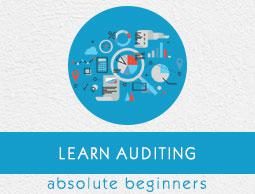Auditing - Introduction
The origin of auditing can be traced to Italy. Around the year 1494, Luca Paciolo introduced the double entry system of bookkeeping and described the duties and responsibilities of an Auditor.
Auditing in India has been described in different ways −
“Auditing is a systematic and independent examination of data, statements, records, operations and performances (financial or otherwise) of an enterprise for a stated purpose. In any auditing situation, the Auditor perceives and recognizes the propositions before him for examination, collects evidence, evaluates the same and on this basis, formulates his judgment which is communicated through his audit report.” - The Institute of Chartered Accountant of India
Another definition goes as such −
“Auditing is an intelligent and critical scrutiny of books of accounts of a business with the documents and vouchers from which they have been written up, for the purpose of ascertaining whether the working results of a particular period as shown by Profit and Loss Account and also the financial position as reflected in the Balance-sheet are truly and fairly determined and presented by those responsible for their compilation.” - J. R. Batliboi
Auditing in India
Let us now understand the growth of auditing in India. The Indian Companies Act, 1913, prescribed for the first time the qualifications of an Auditor. The Government of Bombay was the first to conduct related courses of study such as the Government Diploma in Accountancy (GDA).
The Auditor’s Certificate Rule was passed in 1932 to maintain uniform standard in Accountancy and Auditing. The Chartered Accountant Act was enacted by the Parliament of India in 1939. The Act regulates that a person can be authorized to audit only when he qualifies in the examinations conducted by The Institute of Chartered Accountants of India.
Following are a few other points related to Auditing in India −
Members of Institute of Cost and Works Accountant of India are authorized to conduct cost audit according to Section 233-B of the Companies Act, 1956.
Companies Act 1931 was replaced by Companies Act 1956.
An Auditor can be appointed only by a special resolution as per section 224 The Companies (amendment) Act, 1974.
Bookkeeping
A Bookkeeper records day-to-day transaction in the books of accounts in a systematic manner. Bookkeeping includes −
- Journalizing
- Posting to ledger
- Totaling and balancing of ledger accounts
Accountancy
The job of Accountancy begins where bookkeeping ends and includes the following −
Rectification of errors
Preparation of Trial Balance
Preparation of financial statements (Trading and Profit & Loss account and BalanceSheet, etc.)
Auditing
Preparation of accounts is not the duty of an Auditor. “Auditing begins, where accountancy ends”. Auditor is only concerned for checking and verification of records. Auditor is a qualified person appointed for the purpose of certification of work done by others.
Investigation
An investigation may be done with a specific purpose. It is usually conducted to know the financial position of a business, extent of fraud and misappropriation and the earning capacity of any business unit, etc. The time duration for investigation may also extend beyond one year. Investigation may not be necessarily done by a qualified Chartered Accountant.
Qualities of an Auditor
An Auditor must have the following qualifications and qualities −
He should be a qualified Chartered Accountant or he should be a qualified member of The Institute of Cost & Works Accountants of India to do cost audit.
He must have adequate skills and qualities to conduct his work efficiently.
An Auditor must be honest, impartial and unbiased. He should also be hard-working, have adequate common sense, capacity to hear arguments of others, systematic and methodical.
An Auditor should ask for clarification on matter on which he is unable to understand the information provided to him.
His audit report should be correct and clear.
In case where any suspicious situation arises, he should assume that he is dealing with dishonest and fraudulent peoples.
He must have thorough knowledge of accounting principles and practices.
He must have the know how of all the domestic and international court case decisions.
He must have thorough knowledge of financial management, industrial management and business organizations.
He must have up-to-date knowledge of the Mercantile law and the Companies Act.
Scope of Auditing
In comparison with earlier days, where the main objective of auditing was to detect fraud, we now have enhanced ways to determine a true and fair view of financial statements. In recent times, almost every country of the world has introduced various legislations and framed rules and regulation of auditing. In India also legislations related to Tax Audit, Cost Audit, Management Audit and operation Audit, etc. are coming up.
The main purpose of auditing is to certify the correctness of financial statements and to detect errors and frauds.
Techniques of Auditing
Following are the common techniques of auditing −
- Checking of posting and casting.
- Physical verification of assets.
- Verification and examination of transactions with available evidences.
- Scrutiny of the books of accounts,
- Checking of various calculations.
- Checking of carried forward balances in next year.
- Checking of Bank reconciliation statements.
- Auditor can get information from inside and outside sources of organization.


